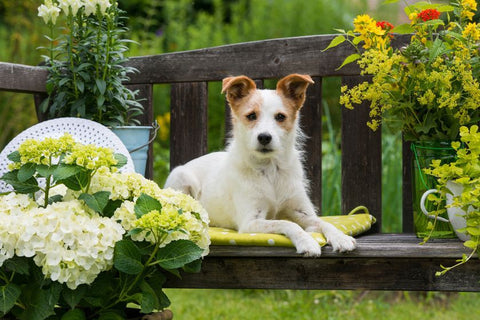Paws and Blooms: Embracing Four-Legged Companions in the Garden
Gardens are often thought of as serene havens, places where the beauty of nature is carefully cultivated. While we traditionally envision plants and flowers as the stars of the garden show, there's a growing trend that involves the inclusion of four-legged friends into this green space. In this article, we'll explore the joys and challenges of having pets in the garden and discover how our furry companions can enhance the overall garden experience.The following content also has some reference value for raised garden beds.
-
Garden Guardians: Choosing the Right Pet:
- Gardens can be a delightful playground for pets, but it's essential to consider the type of four-legged friend that best suits your outdoor space. While dogs and cats are common choices, some gardeners also opt for rabbits, guinea pigs, or even chickens. Each pet comes with its own set of needs and considerations.
-
Paws and Plants: Pet-Friendly Flora:
- When designing a garden with pets in mind, it's crucial to choose plants that are safe for them. Avoid toxic plants and opt for pet-friendly options like lavender, rosemary, and sunflowers. Designate specific areas for your pets to play, and consider incorporating pet-friendly grass varieties that can withstand playful paws.
-
Digging, Prancing, and Playing: Creating Pet Zones:
- Pets love to explore and interact with the environment, and your garden should be no exception. Designate areas where pets can dig, play, and relax without causing harm to delicate plants. Use hardscaping elements like decorative rocks or mulch to create defined pet zones that blend seamlessly with the overall garden design.
-
Enrichment and Exercise: The Benefits of a Pet-Inclusive Garden:
- Gardens offer a wealth of sensory experiences for pets, from the rustling of leaves to the scent of blooming flowers. Incorporating features like agility courses, tunnels, or even a simple water feature can provide mental and physical stimulation for your four-legged friends. This not only keeps them entertained but also encourages a healthy and active lifestyle.
-
Garden Challenges and Solutions:
- While the idea of having pets in the garden is appealing, it does come with its challenges. Issues like digging, potential damage to plants, and the need for proper waste management must be addressed. By anticipating these challenges and implementing solutions such as raised beds, pet-friendly barriers, and regular grooming, you can strike a harmonious balance between your garden and your pets.
Welcome in the Garden:
-
Dogs:
- Well-behaved dogs can make excellent garden companions. They enjoy outdoor spaces and can provide a sense of security.
- Consider creating designated paths or play areas to minimize the impact on delicate plants.
-
Cats:
- Cats can help control pests like rodents and insects.
- Provide elevated spaces or cat-friendly plants to keep them entertained without disturbing delicate flower beds.
-
Rabbits and Guinea Pigs:
- These small herbivores can be kept in enclosed spaces or designated areas with rabbit-friendly plants.
- Be cautious about their nibbling habits and protect vulnerable plants with fencing.
-
Chickens:
- Chickens are excellent for pest control and fertilizing the soil.
- Use mobile coops to rotate their access, preventing them from overgrazing in a specific area.
Not Welcome in the Garden:
-
Destructive Dogs:
- Dogs with a penchant for digging or chewing may harm plants and landscaping.
- Train your dog or create barriers to protect sensitive areas.
-
Free-Roaming Cats:
- Cats that dig up flower beds or use them as litter boxes can be problematic.
- Consider installing barriers like cat-proof fencing or using repellents to discourage them.
-
Rodents:
- While small caged rodents can be pets, wild rodents can wreak havoc in the garden.
- Employ humane pest control methods to keep them at bay.
-
Goats and Larger Livestock:
- Larger animals like goats can quickly decimate vegetation.
- If you have large livestock, keep them in designated areas away from delicate plants.
Conclusion:
Incorporating four-legged companions into your garden can be a rewarding experience, fostering a deeper connection between nature and your furry friends. By choosing the right pets, selecting pet-friendly plants, creating designated play areas, and addressing potential challenges, you can create a harmonious garden that is both a retreat for you and a paradise for your pets. So, let the paws and blooms coexist, creating a vibrant and lively outdoor space for everyone to enjoy.


